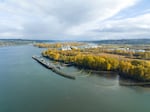Oregon land-use regulators have struck down a challenge against a Houston-based company proposing one of the largest renewable diesel refineries on the West Coast.
Developers behind the refinery say they’re scheduled to start building near Clatskanie next year, but it’s not a sure thing yet. There are more permits to obtain, and also this latest decision could be appealed by opposing environmental and land conservation groups.

An undated aerial view of Port Westward on the lower Columbia River. Environmental and land conservation groups say NXTClean Fuels facility would jeopardize local farms.
Paloma Ayala / Courtesy of Columbia Riverkeeper
Earlier this summer, two conservation nonprofits and a local farmer filed an appeal with the Oregon Land Use Board of Appeals, or LUBA.
The groups were asking regulators to reverse a county-approved permit allowing NXTClean Fuels, also known as NEXT Renewable Fuels, to build a quarter-mile rail line from its proposed site to a main rail line, the Portland and Western Railroad line, on land zoned for farm use.
Columbia Riverkeeper and 1000 Friends of Oregon argued the type of rail infrastructure NEXT wants to build for transporting and storing refined fuel isn’t allowed on the portion of the land zoned for agricultural use, as per the state’s zoning rules.
In a Nov. 26 decision, LUBA board members sided with NEXT and Columbia County commissioners. In a 36-page decision, board members affirmed the developer’s rail line plans meet state regulations.
“LUBA is not at all a rubber stamp agency,” said Michael Hinrichs, a spokesperson for NEXT. “And so you have land use experts saying, ‘Yeah, the appellants’ arguments don’t hold water. What the proponent is proposing is completely legit and within the law.’”
Audrey Leonard, an attorney with Columbia Riverkeeper, told OPB the decision is disappointing.
“While we don’t agree with that [decision], this was just one tool in our tool belt to fight the project,” Leonard said.
NEXT is proposing to build a $3 billion refinery at the Port of Columbia County Port Westward Industrial Park on the lower Columbia River. When fully operational, the facility will be able to crank out up to 50,000 barrels a day, or about 750 million gallons a year, of sustainable jet fuel and renewable diesel made out of fish grease, used cooking oil and other agricultural waste. Renewable diesel has a lower carbon footprint compared to petroleum-based diesel, according to the U.S. Department of Energy.
The project has received support from local elected officials, business groups, labor unions and some residents.
NEXT developers say the refinery would contribute to Oregon’s decarbonization goals, create local jobs and generate $45 million per year in local and state tax revenue. However, environmental and land conservation groups, and some residents, say the project is anything but renewable or sustainable.
Some farmers and residents say the refinery and proposed rail line would disrupt working farms and damage a system of delicate dikes and levees that control water drainage in the area. Environmental groups say the facility would release harmful gasses and also claim NEXT would actually use tons of fossil fuels to generate its renewable diesel.
The Columbia River Inter-Tribal Fish Commission has also publicly opposed the project, citing concerns about water degradation and negative impacts to juvenile salmon and other aquatic species.
The LUBA decision comes as NEXT seeks a water quality permit from the Oregon Department of Environmental Quality. Environmental, tribal and farm groups have called on Oregon Gov. Tina Kotek and DEQ to reject the permit. DEQ has until Jan. 12 of 2025 to make a decision. Hinrichs told OPB that NEXT is still set to begin construction in 2025, though the facility still needs to clear several other permits, including an environmental impact assessment from the U.S. Army Corp of Engineers.
Hinrichs said that, despite some local pushback, the project is designed with the spirit of Oregon’s environmental regulations in mind.
“It’s difficult to build in Oregon, but when you meet those standards and you get those approvals, that says something about how good of a design you have, how good of a project you have. And that makes us incredibly proud,” he said.
Leonard with Columbia Riverkeeper said she and people with other opposing groups will continue to challenge the project.
“We will continue to fight this project at every level,” she said. “This project is still far from jumping through all the hoops that it needs to jump through.”
